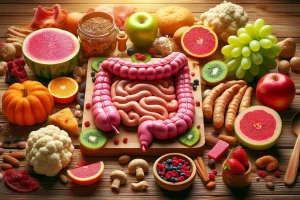10 such foods which can cause harm to your Intestines, know which are those foods!

In today’s world, where food options are abundant, we often overlook the impact of our dietary choices on our digestive health. While some foods nourish our bodies, others can wreak havoc on our intestines, leading to discomfort and long-term health issues. So, 10 foods which can cause harm to your intestines, know which are those foods! Understanding these harmful foods is essential for maintaining a healthy gut and overall well-being. Let’s explore the foods that can be detrimental to your intestinal health and why you might want to limit their intake.
- 10 such foods which can cause harm to your Intestines, know which are those foods!
- 1. Processed Foods
- 2. Dairy Products
- 3. Red Meat
- 4. Gluten-Containing Foods
- 5. Fried Foods
- 6. Artificial Sweeteners
- 7. Caffeine
- 8. Spicy Foods
- 9. High-Sugar Foods
- 10. Certain Vegetables
1. Processed Foods
Processed foods, often laden with artificial additives, preservatives, and refined sugars, are among the top culprits when it comes to harming your intestines. These foods can disrupt the delicate balance of gut bacteria, which is crucial for digestion and overall health. The high levels of sugar and unhealthy fats found in many processed snacks can promote the growth of harmful bacteria in the gut, leading to inflammation and digestive issues.
Furthermore, processed foods often lack essential nutrients, such as fiber, which is vital for healthy digestion. A diet low in fiber can result in constipation and other gastrointestinal problems. Fiber helps to bulk up stool, making it easier to pass and preventing conditions like diverticulitis, which is an inflammation of the intestinal wall.
To protect your gut health, it is advisable to limit processed foods and focus on whole, nutrient-dense options. Incorporate fruits, vegetables, whole grains, and lean proteins into your meals to promote a healthy intestinal environment.
2. Dairy Products
Dairy products can be problematic for many individuals, especially those who are lactose intolerant. Lactose intolerance occurs when the body lacks the enzyme lactase, which is needed to digest lactose, the sugar found in milk. For those with this condition, consuming dairy can lead to symptoms such as bloating, gas, diarrhea, and abdominal pain.
Even for individuals who are not lactose intolerant, excessive consumption of dairy products can lead to digestive distress. Some studies suggest that certain dairy proteins may trigger inflammation in the intestines, potentially leading to issues such as leaky gut syndrome, where the intestinal lining becomes permeable and allows toxins to enter the bloodstream.
If you suspect that dairy is causing you digestive issues, consider alternatives such as lactose-free milk, almond milk, or coconut yogurt. These options can provide similar nutritional benefits without the gastrointestinal discomfort.
3. Red Meat
While red meat is a good source of protein and essential nutrients like iron and zinc, excessive consumption can pose risks to your intestinal health. High intakes of red meat, especially processed varieties such as sausages and bacon, have been linked to an increased risk of colorectal cancer. This is thought to be due to the presence of harmful compounds that form during the cooking process, such as heterocyclic amines (HCAs) and polycyclic aromatic hydrocarbons (PAHs).
Moreover, red meat can be difficult to digest for some individuals, leading to bloating and discomfort. The high saturated fat content in certain cuts can also negatively affect gut microbiota, further exacerbating digestive issues.
To maintain a healthy gut, consider moderating your red meat consumption and incorporating more lean proteins, such as fish, chicken, legumes, and plant-based alternatives, into your diet.
4. Gluten-Containing Foods
Gluten is a protein found in wheat, barley, and rye, and while many people can digest it without issues, some individuals may have gluten sensitivity or celiac disease, an autoimmune condition triggered by gluten consumption. For those with these conditions, consuming gluten can lead to severe intestinal damage and various gastrointestinal symptoms, including diarrhea, bloating, and abdominal pain.
Even for individuals without gluten sensitivity, excessive gluten consumption can lead to digestive discomfort, as gluten is present in many processed foods that are low in fiber and nutrients. A diet high in gluten-containing foods may contribute to an imbalance in gut bacteria and promote inflammation.
If you suspect gluten is affecting your digestive health, consider trying a gluten-free diet under the guidance of a healthcare professional. Exploring gluten-free grains like quinoa, rice, and millet can offer alternatives that are gentler on the intestines.
5. Fried Foods
Fried foods, such as french fries, fried chicken, and doughnuts, are often high in unhealthy fats and low in nutritional value. The frying process creates compounds that can irritate the intestinal lining, leading to inflammation and digestive discomfort. Moreover, these foods are typically low in fiber, which is essential for healthy digestion.
Consuming fried foods regularly can contribute to the development of conditions like gastritis, where the stomach lining becomes inflamed, and may even exacerbate symptoms of acid reflux. Additionally, the high calorie and fat content of fried foods can lead to weight gain, which is linked to various health issues, including digestive problems.
To protect your intestines, aim to limit fried foods and opt for healthier cooking methods such as baking, grilling, or steaming. Incorporating more whole foods into your diet can also help maintain optimal digestive health.
6. Artificial Sweeteners
Artificial sweeteners, often found in “diet” or “sugar-free” products, may seem like a healthier alternative to sugar, but they can negatively impact intestinal health. Research suggests that certain artificial sweeteners, such as aspartame and sucralose, can disrupt the balance of gut microbiota, leading to increased inflammation and digestive issues.
Some individuals may experience gastrointestinal symptoms, including bloating and diarrhea, after consuming products containing artificial sweeteners. This is particularly true for sugar alcohols like sorbitol and xylitol, which can cause laxative effects in some people.
To support your gut health, consider reducing your intake of artificial sweeteners and opting for natural alternatives like honey, maple syrup, or stevia in moderation. Monitoring how your body reacts to these sweeteners can also guide your choices for better digestive health.
7. Caffeine
Caffeine, commonly found in coffee, tea, and energy drinks, can stimulate the digestive system and lead to increased acid production in the stomach. While moderate caffeine consumption can have health benefits, excessive intake can result in digestive distress, including acid reflux, heartburn, and gastrointestinal upset.
Caffeine can also act as a diuretic, leading to dehydration, which may worsen constipation and other digestive issues. For individuals with sensitive stomachs or pre-existing gastrointestinal conditions, caffeine can exacerbate symptoms and lead to discomfort.
If you find that caffeine negatively affects your digestion, consider moderating your intake or switching to decaffeinated options. Herbal teas can also provide a soothing alternative without the stimulating effects of caffeine.
8. Spicy Foods
Spicy foods can add flavor and excitement to meals, but for some individuals, they can be a source of digestive distress. Capsaicin, the active compound in chili peppers, can irritate the gastrointestinal lining, leading to symptoms such as heartburn, diarrhea, and abdominal pain.
For those with conditions like irritable bowel syndrome (IBS) or gastroesophageal reflux disease (GERD), consuming spicy foods may exacerbate symptoms and lead to discomfort. While spices can have health benefits, moderation is key.
If you enjoy spicy foods but experience digestive issues, consider experimenting with milder alternatives or incorporating spices that are gentler on the stomach, such as turmeric or ginger, which can also offer anti-inflammatory benefits.
9. High-Sugar Foods
Foods high in added sugars, such as candies, pastries, and sugary drinks, can negatively impact your intestines in several ways. High sugar consumption can lead to an imbalance in gut bacteria, promoting the growth of harmful bacteria and yeast, which can contribute to digestive issues like bloating and gas.
Moreover, excessive sugar intake is linked to inflammation, which can further irritate the gastrointestinal tract. The overconsumption of sugary foods can also lead to insulin resistance, obesity, and other metabolic issues that can affect overall health.
To maintain a healthy gut, it’s advisable to limit added sugars and focus on naturally sweet foods, such as fruits. Incorporating whole foods into your diet can help stabilize blood sugar levels and support optimal digestive health.
10. Certain Vegetables
While vegetables are generally considered healthy, some can cause digestive issues for certain individuals. Cruciferous vegetables like broccoli, cauliflower, and Brussels sprouts contain complex sugars that can be difficult to digest, leading to gas and bloating. These vegetables are also high in fiber, which can be beneficial in moderation but may cause discomfort in excessive amounts.
Additionally, nightshade vegetables, including tomatoes, peppers, and eggplants, can trigger digestive discomfort in individuals





